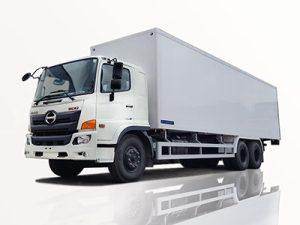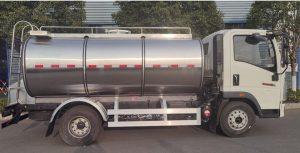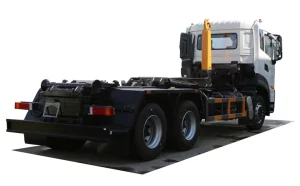Monday to Saturday - 8:00 -17:30
Electric Tractor Trailers: The Future of Sustainable Transportation
Introduction
Electric tractor trailers are becoming a crucial part of the conversation surrounding sustainable transportation solutions. As the world grapples with the effects of climate change, the freight and trucking industry is under pressure to reduce its carbon footprint. Electric tractor trailers offer a promising alternative to traditional diesel-powered vehicles, providing an environmentally friendly solution while also bringing technological advancements. This article will delve into what electric tractor trailers are, their benefits and challenges, the current market landscape, examples of existing models, and what the future may hold for this innovative technology.
Understanding Electric Tractor Trailers
Electric tractor trailers are heavy-duty trucks powered primarily by electric motors instead of internal combustion engines. These vehicles utilize large battery packs to power the motors, providing the necessary energy to transport goods over long distances. Traditionally used for over-the-road travel, tractor trailers often require significant amounts of fuel, which contributes to greenhouse gas emissions. Electric tractor trailers aim to solve these problems.
How Electric Tractor Trailers Work
Electric tractor trailers use batteries to store energy, which powers electric motors that drive the wheels. Regenerative braking technology is often incorporated, which allows the vehicle to recover energy during deceleration. This energy can help recharge the batteries, enhancing overall efficiency. Additionally, some electric trailers can be equipped with solar panels to supplement energy needs.
Key Components of Electric Tractor Trailers
- Batteries: Large lithium-ion batteries are commonly used as they provide a high energy density.
- Electric Motors: These motors convert electrical energy into mechanical energy, driving the wheels of the trailer.
- Charging Systems: Charge points and fast chargers facilitate energy replenishment at logistics hubs or along routes.
- Telematics: Advanced data systems optimize routes, monitor energy consumption, and provide maintenance updates.
The Benefits of Electric Tractor Trailers
1. Environmental Benefits
One of the most compelling arguments for electric tractor trailers is their potential to significantly reduce greenhouse gas emissions. Compared to traditional diesel trucks, electric models can reduce emissions by up to 90% when powered by renewable energy sources. This contributes to cleaner air and a reduced carbon footprint.
2. Cost Savings
Electric tractor trailers can lead to significant cost savings over time. While the upfront costs may be higher, lower fuel costs, reduced maintenance expenses, and potential government incentives can make them financially viable in the long run. On average, electric trucks can save fleet operators thousands of dollars annually in fuel and maintenance costs.
3. Noise Reduction
Electric motor systems operate much more quietly than traditional diesel engines, which is beneficial for urban areas where noise pollution is a concern. This can create a better environment for residents and workers near busy freight corridors.
4. Performance and Technology Integration
Electric tractor trailers are often equipped with the latest technology, including advanced driver-assistance systems (ADAS) and telematics. This enhances safety and can lead to improved fuel efficiency. Many trucks include features such as adaptive cruise control, lane-keeping assistance, and automatic emergency braking.
Challenges Facing Electric Tractor Trailers
1. Battery Technology Limitations
While battery technology has advanced in recent years, limitations still exist, particularly regarding energy density and weight. Current battery packs can be heavy, which impacts the overall weight capacity of the trailers. Additionally, charging times can be long, limiting the operational efficiency of electric trucks.
2. Infrastructure Development
The establishment of a robust charging network is crucial for the widespread adoption of electric tractor trailers. Currently, charging infrastructure is not as extensive as it is for conventional diesel trucks, causing range anxiety among fleet operators and limiting practicality in certain regions.
3. Initial Investment Costs
Electric tractor trailers typically come with a higher price tag compared to their diesel counterparts. While operational costs may be lower, the initial investment can be a hurdle for many fleet operators to overcome. Financing options and government incentives can help mitigate some of these costs.
4. Regulatory Challenges
While regulations are becoming more favorable towards electric vehicles, certain policies can create hurdles. Import tariffs, emission standards, and tax credits can vary by region, making it necessary for operators to navigate an uneven regulatory landscape to fully benefit from electric trucking.
The Current Market Landscape
Key Players in the Electric Tractor Trailer Market
| Company | Model | Range (miles) | Payload Capacity (lbs) |
|---|---|---|---|
| Tesla | Tesla Semi | 300-500 | 80,000 |
| Freightliner | E-Cascadia | 250 | 66,000 |
| Rivian | Rivian EDV | 400 | 20,000 |
| BYD | BYD 8TT | 150-300 | 80,000 |
Investment Trends
Investment in electric tractor trailers is expected to grow significantly over the coming years. A merger between traditional trucking companies and tech firms is leading to innovative solutions that facilitate the transition to electric fleets. There are also numerous partnerships being formed to develop charging infrastructure, which is critical for the future of this market.
Examples of Electric Tractor Trailers in Action
1. Tesla Semi
The Tesla Semi is one of the most anticipated electric tractor trailers on the market. Promised to have a range of up to 500 miles, this truck utilizes Tesla’s battery technology to maximize efficiency. Companies like PepsiCo have already placed significant orders, anticipating their deployment in the near future.
2. Freightliner E-Cascadia
Freightline’s E-Cascadia focuses on regional distribution and can provide a range of 250 miles, making it suitable for urban logistics. Fields such as grocery and package delivery are beginning to adopt this model as proof of the growing acceptance of electric trucks.
3. BYD 8TT
BYD’s electric truck offers flexibility in range and payload, catering to various needs in freight transport. With heavy-duty capabilities, it is being tested by major retailers for short-range deliveries to preserve the environment in urban settings.
Future Trends for Electric Tractor Trailers
1. Advances in Battery Technology
Future improvements in battery technology could enhance the range, longevity, and efficiency of electric tractor trailers. Research into solid-state batteries and next-gen lithium batteries shows great promise for reducing weight and increasing storage capacity.
2. Autonomous Electric Trucks
The integration of autonomous technology with electric vehicle systems could revolutionize freight transport. Automated trucking could reduce labor costs and improve efficiency, contributing to safety and performance gains.
3. Expansion of Charging Networks
As electric vehicles become more mainstream, the demand for charging stations will increase. Governments and private companies are investing in developing widespread infrastructure, which is essential for the sustainable growth of electric tractor trailers across diverse regions.
4. Policy Changes and Incentives
As governments aim for greener transportation systems, favorable policies, tax incentives, and grants will likely help drive investments in electric tractor trailers. Legislative support is essential to motivate fleet operators to transition to electric models.
Practical Tips for Transitioning to Electric Tractor Trailers
1. Assess Your Operating Needs
Before transitioning to electric, fleet operators should assess their daily routes, payload requirements, and total operating costs. Understanding these factors can help determine the viability of electric tractor trailers in their fleet.
2. Explore Local Incentives
Research available incentives for electric vehicle purchases in your region. Many governments offer tax credits, grants, and subsidies that can substantially offset the initial investment costs.
3. Plan for Charging Infrastructure
Evaluate your depot and route needs to determine the most strategic locations for electric charging stations. Consider investing in fast charging solutions to minimize downtime and ensure operational efficiency.
4. Collaborate with Electric Vehicle Experts
Engaging with experts in electric vehicle technology can provide valuable insights and guidance throughout the transition process. From vehicle selection to infrastructure planning, collaborating with industry specialists can help smooth the change.
FAQs
1. What is the range of electric tractor trailers?
The range of electric tractor trailers varies by model, with most capable of traveling between 150 to 500 miles on a single charge, depending on factors like load weight and driving conditions.
2. How do electric tractor trailers compare to diesel trucks?
Electric tractor trailers offer lower emissions, reduced noise levels, and potentially lower operating costs compared to diesel trucks, although the initial purchase price is generally higher.
3. Are electric tractor trailers suitable for long-haul transportation?
Currently, most electric tractor trailers are better suited for regional rather than long-haul transport due to charging time and range. However, advancements in battery technology may soon change this.
4. What are common challenges of electric tractor trailers?
Challenges include battery limitations, the need for charging infrastructure, higher initial investment costs, and navigating governmental regulations and incentives.
5. Will electric tractor trailers be autonomous?
There is significant interest in the intersection of electric and autonomous vehicles. Many manufacturers are exploring how to integrate autonomous technology with electric truck systems, but widespread deployment is still in progress.
6. What incentives are available for purchasing electric tractor trailers?
Incentives vary by country and region, but often include tax credits, grants, and rebates designed to promote the transition to cleaner transportation technologies.








